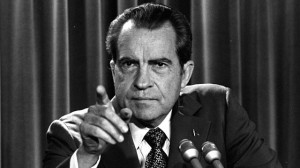This week on Moyers & Company Bill Moyers interviewed Mother Jones editors Monika Bauerlein and Clara Jeffery. Online in our “World of Ideas” blog, we spoke with reporter Andy Kroll. His beat is following the “dark money” in the 2012 election.
In this month’s issue of Mother Jones, Kroll explores how money has always played a crucial roll in American politics. He reminds us that the Watergate scandal broke when money deposited in the bank account of one of the men involved in the Democratic National Headquarters break-in was traced back to President Nixon’s campaign. Public outrage about Watergate forced Nixon out of office. Kroll writes that in many ways the post-Citizens United era is reminiscent of that time.
“Almost 40 years later, that outrage is back. Mass movements like the tea party and Occupy have channeled popular anger at a political system widely seen as backward and corrupt. In the age of the super-PAC, Americans commonly say there’s too much money in politics, that lobbyists have too much power, and that the system is stacked against the average citizen. ‘Our government,’ as one Occupy DC protester put it, ‘has allowed policy, laws, and justice to be for sale to the highest bidder.’
For many political observers, it feels like a return to the pre-Watergate years. Rich bankrollers—W. Clement Stone then, Sheldon Adelson now—cut jaw-dropping checks backing their favorite candidates. Political operatives devise ways to hide tens of millions in campaign donations. And protesters have taken to the streets over what they see as a broken system. ‘We’re back to the Nixon era,’ says Norman Ornstein of the conservative American Enterprise Institute, ‘the era of undisclosed money, of big cash amounts and huge interests that are small in number dominating American politics.’ This is the story of how we got here.”
Read the entire article at Mother Jones.


